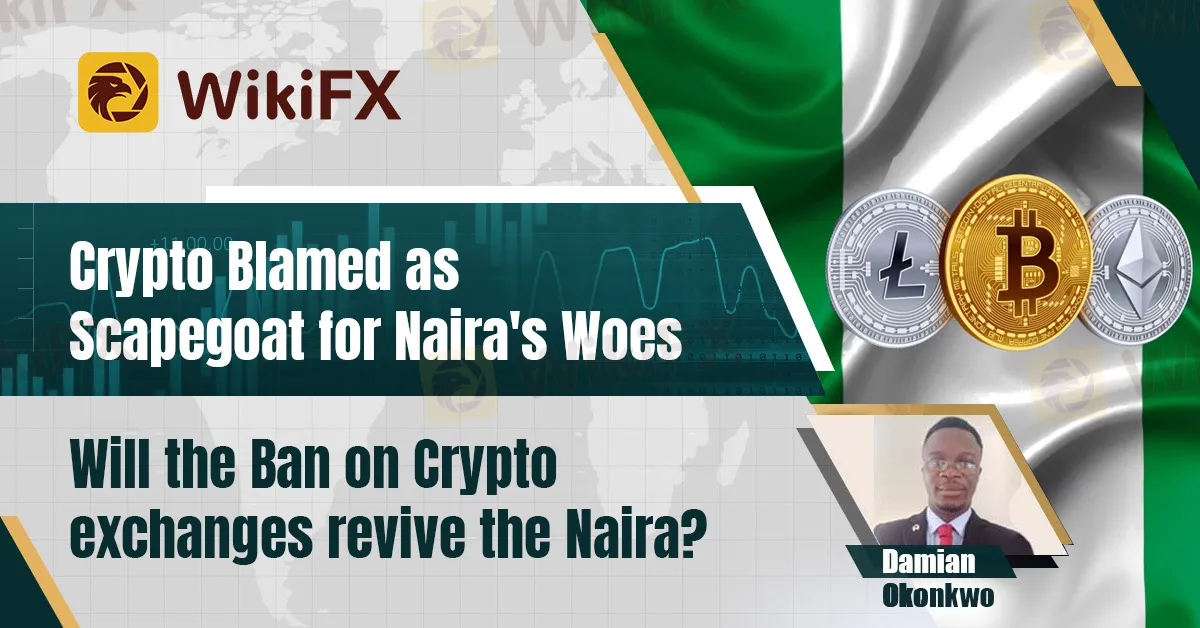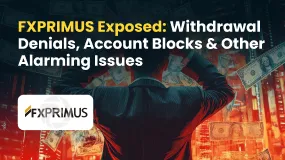简体中文
繁體中文
English
Pусский
日本語
ภาษาไทย
Tiếng Việt
Bahasa Indonesia
Español
हिन्दी
Filippiiniläinen
Français
Deutsch
Português
Türkçe
한국어
العربية
Crypto Blamed as Scapegoat for Naira's Woes, Will the Ban on Crypto exchanges revive the Naira?
Abstract:Nigeria's crypto landscape remains in flux. While the ban may not be the main culprit behind the Naira's struggles, a more nuanced approach is needed.

By: Damian Okonkwo

Introduction
The Nigerian Naira has been on a protracted downward spiral in 2024, leading to finger-pointing and a search for possible causes. Recently, the Nigerian government has pushed the blame to the activities of P2P crypto traders creating high demand for dollars across the trading platforms. Will the ban on Crypto exchanges solve the Naira's woes?
Naira's Woes: A Multitude of Factors
The Naira's struggles stem from a confluence of factors outside crypto. These includes:
1. Global Oil Price Fall: Nigeria is heavily reliant on oil exports. The recent decline in global oil prices has significantly reduced government revenue, weakening the Naira's value.
2. Dollar Scarcity: Lower oil revenue has limited Nigeria's access to foreign exchange, making it harder for businesses and individuals to obtain dollars, further pressuring the Naira
3. High Inflation: Rising inflation erodes the purchasing power of the Naira, discouraging investment and economic activity.
Crypto: Not the Main Culprit
While cryptocurrency use has grown in Nigeria, it's unlikely to be a significant contributor to the Naira's woes. The total volume of crypto transactions in Nigeria is dwarfed by the official foreign exchange market. Additionally, the CBN ban primarily targeted centralized exchanges, not peer-to-peer transactions, which are harder to regulate.
The Ban's Impact: Double-Edged Sword
The CBN's ban on crypto exchanges aimed to curb capital flight and protect Nigerians from potential scams. However, it also:
Pushed Nigerians to Foreign Exchanges: The ban drove some Nigerians to use foreign crypto exchanges, making it harder for the CBN to track financial flows.
Stifled Innovation: Nigeria has a vibrant tech scene, and the ban hinders the development of a local crypto industry that could contribute to economic growth.
Reviving the Naira: A Holistic Approach
The path to a stronger Naira requires a multi-pronged approach:
● Diversifying the Economy: Reducing reliance on oil by promoting other sectors like agriculture and manufacturing can provide a buffer against oil price fluctuations.
● Increasing Foreign Investment: Creating a more attractive investment climate can entice foreign investors to bring in much-needed dollars.
● Taming Inflation: Implementing sound fiscal and monetary policies to curb inflation is crucial for stabilizing the Naira.
The Future of Crypto in Nigeria
Nigeria's crypto landscape remains in flux. While the ban may not be the main culprit behind the Naira's struggles, a more nuanced approach is needed. Fostering innovation and creating a regulatory framework for crypto could be more beneficial than an outright ban. Reviving the Naira requires addressing the underlying economic issues and exploring new opportunities, not scapegoating new technologies.

Disclaimer:
The views in this article only represent the author's personal views, and do not constitute investment advice on this platform. This platform does not guarantee the accuracy, completeness and timeliness of the information in the article, and will not be liable for any loss caused by the use of or reliance on the information in the article.
Read more

Investing in Coinexx? Think Again Before Your Account Balance Hits ZERO
Coinexx has emerged as a nightmare for traders who once saw potential and profit in its platform. The problems lie in its lack of transparency, which has left many investors with a ZERO balance. Scamming investors by employing fraudulent tactics and introducing bogus trading rules is increasingly becoming its status symbol. The endless negative reviews of this scam broker are trending on various platforms. To expose the troubling investor experiences, we’ve compiled sharp complaints from verified users of Coinexx. Read on!

UnityFXLive: How This Broker Scammed Over $350,000 ? Know the Red Flags
On August 4, 2025 Indian police arrested two men for running a fake forex trading scam under the name UnityFXLive.com. The suspects were caught operating from a rented office in Goregaon, Mumbai. During questioning, they revealed the name of a third person who is believed to be the mastermind behind the scam. He is currently on the run. The scammers promised people high returns on forex investments, but instead of doing real trading, they stole the money using fake online platforms.

FXPRIMUS Exposed: Withdrawal Denials, Account Blocks & Other Alarming Issues
Have your fund withdrawal applications been constantly denied by FXPRIMUS? Does the forex broker inappropriately block your trading account? Are your deposits disappearing without reaching your trading account? There’s something seriously wrong with this forex broker, whose track record keeps getting worse by the day. Many traders have expressed their anguish on several broker review platforms. While reading those reviews, we could not resist exposing this broker. Check out how traders have criticized FXPRIMUS for its illicit acts.

FXPRIMUS Exposed: Withdrawal Denials, Account Blocks & Other Alarming Issues
Have your fund withdrawal applications been constantly denied by FXPRIMUS? Does the forex broker inappropriately block your trading account? Are your deposits disappearing without reaching your trading account? There’s something seriously wrong with this forex broker, whose track record keeps getting worse by the day. Many traders have expressed their anguish on several broker review platforms. While reading those reviews, we could not resist exposing this broker. Check out how traders have criticized FXPRIMUS for its illicit acts.
WikiFX Broker
Latest News
Binance Users Convert Crypto and Withdraw Instantly to Mastercard
Forex Swaps Explained in 5 Minutes – Everything You Need to Know
One Click on Facebook Cost a 77-Year-Old Over RM100,000
What WikiFX Found When It Looked Into TradeFW
Should You Trust DeltaStock? Key Warning Signs to Consider
Interactive Brokers Launches TipRanks Analytics, Forecast Contracts in Europe
UnityFXLive: How This Broker Scammed Over $350,000 ? Know the Red Flags
Best MT4 Brokers in the USA in 2025
FXPRIMUS Exposed: Withdrawal Denials, Account Blocks & Other Alarming Issues
Best MetaTrader Forex Brokers in the Philippines 2025
Currency Calculator


